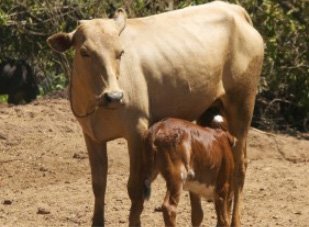Mastitis in Cows

What is Mastitis?
Mastitis is a common and devastating disease usually affecting Dairy Cattle Breeds. The disease is symptomatized by the inflammation of the mammary gland and udder of the cows. This is a major endemic disease of the dairy cattle but can affect all other lactating mammals also. The disease appears with varying forms and types of symptoms and often difficult to be detected in the early stage. Depending on the symptoms and the severity, the disease is known by different names.
Definitions of Mastitis
- Severe Clinical Mastitis : This is the advanced stage of the disease where the cow is extremely ill with gangrenous udder and even the milk looks abnormal with flakes and blood clots. If left untreated the cow may die at this stage of the disease.
- Acute Clinical Mastitis : The udder becomes swollen, painful and hot to touch, but the cow may not be visibly sick. The milk may contain blood clots and abnormal.
- Clinical Mastitis : In this condition, the cow looks indifferent and udder does not show any visible symptoms. But the milk will be abnormal with traces of blood and clot.
- Sub Clinical Mastitis : This is still more disguised version of the disease in which the cow will be quite normal and fine and you cannot see any visible changes in the milk as well. But the composition of the milk gets altered, which can be detected through chemical analysis of the milk.
- Mild Clinical Mastitis : This is the form of the disease where the affected cow is apparently normal and the udder also without any symptom. But the milk may contain few flakes or clots.
- Chronic Mastitis : This is a misleading form of mastitis where the cow will be quite normal and fine. The milk may be more watery and the udder tissue will have lumps, may not be visible but can be felt on touching.
What Causes Mastitis?
Mastitis is caused by the infection of pathogenic bacteria to the mammary gland. The bacteria gain entry into the udder usually through the teat canal and start multiplying profusely in the udder, where they find an abundant supply of nutrients. The metabolic byproducts of the bacteria cause poisoning of the udder tissues inducing an inflammation. The inflammation is basically due to the autoimmune response of the cow to the toxic metabolites released by the bacteria. However, mastitis can also be caused by other reasons like chemical, mechanical and thermal injuries to the udder of the cow. These are, however, not persistent and propagative, unlike the bacteria-induced mastitis.
How to Treat Mastitis?
- Antibiotic Treatment : Like in the case of all other bacterial diseases, the antibiotic application is the most common treatment option for mastitis. External applications of antibiotics to the udder and teats and intramammary antibiotic application are commonly recommended if the case is not severe. The milk of antibiotic-treated cows is not recommended for human consumption. Calves can be fed and extra milk should be drained.
- Intramammary Infusions : In this mode of treatment, the teats are cleaned and disinfected with ethanol (70%), allowed to dry for a few seconds. The cannula containing the infusion is inserted partially into the teats. This can prevent secondary infection by fungi and bacteria.
- Oxytocin Treatment : This is a complementary measure used for making the antibiotic treatment more effective in curing the mastitis. Oxytocin is a hormone which enhances milk let down in mammals. This is injected as a facilitator for draining out the milk from the udder frequently so as to make the udder and teat canals contain minimum milk. This prevents surplus nourishment to the bacteria in the udder making them more vulnerable to the antibiotics.
- Vaccination : This is the most effective treatment for mastitis and can avoid infection in big herds of cattle. However, vaccines against mastitis are partially successful so far.
- Home Remedy : To treat a big cow with mastitis- Take 100 gms red chilli powder, 100 gms onion paste, 150 gms salt, ( do not add water at all ). Make small ball and wrap it in tissue paper. Take the tongue out and put this in the mouth. Since this is covered with paper the cow should swallow it easily and without touching the tongue. Do not put water or mix in the food and give. Milk the cow every 2 hours and empty the udder.
Help Us Now

Donate to Surabhivana Gaushala to save and protect Indian Cow Breeds.
All donations are exempt under Section 80G of the Income Tax Act, 1961. All donation receipts shall be mailed to the address given by the donor or may be collected in person, at request.
Click the below button to donate through credit cards/debit cards or Net Banking via Razor Pay.
